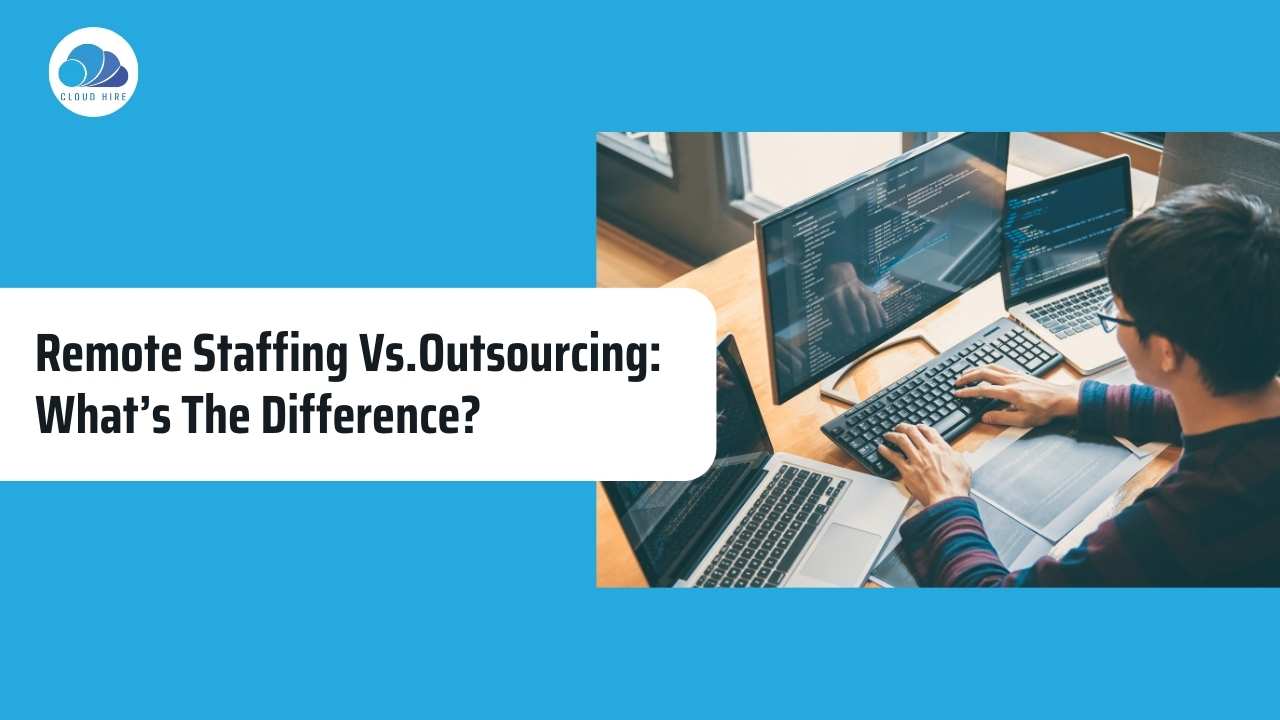Before you decide whether to outsource or not, as a remote staffing provider, you might want to know what’s the difference between outsourcing and remote staffing. Both are often used interchangeably when discussing work style and team management I do believe that both staffing types have their benefits, so let’s take a closer look at each one!
Remote Staffing Is Plug-and-Play:
Remote staffing is a great way to find temporary workers. You can post jobs, hire employees and get them on the job quickly. There are lots of benefits to remote staffing, but one of the biggest is that it’s easy and convenient for employers.
Remote Staffing Has Many Different Forms:
Remote hiring – this involves recruiting, interviewing, and hiring employees from remote locations through an online portal or app. The process typically takes about two days from start to finish, with an invitation to apply sent out via email or social media.
Remote interviewing – this involves conducting interviews over video chat like Skype or Google Hangouts instead of face-to-face or phone calls. interviews can be conducted in real-time, or candidates can be interviewed at their convenience by scheduling a time when they’re available to meet.
Remote work – this involves getting your employees working remotely from home offices, coffee shops, or other locations that are easily accessible by public transport or carpooling with colleagues who live nearby (or even just within walking distance).
Outsourcing Is an Asset:
Outsourcing can help you save time, money, and resources.
You can outsource almost everything you do in business and it has its benefits. If you have a lot of tasks to complete and you don’t have time to do them, outsourcing can be your best solution. You can outsource certain tasks to other companies or individuals who are experts at those specific tasks, so they can complete the work while you focus on other areas of your business.
You can also outsource projects that require specialized knowledge or skills that you don’t have access to. For example, if you’re looking for someone who can design beautiful logos for your company or someone who specializes in data analysis and visualization, then outsourcing these services is probably going to be best for your business because no one else will be able to provide these services as efficiently as the professionals that specialize in this area of expertise.
Outsourced Staff Is Self-Sufficient:
Outsourced staff can be more expensive than regular employees because they have no employer’s benefits like paid holidays or sick pay. However, they generally have better working hours and more flexible schedules than permanent employees.
Outsourcing Can Also Be Project-Based, but It Is Not Limited to That:
Outsourcing is the process of contracting a company to provide management, technical and other services. It can be done on a permanent or temporary basis.
Outsourcing can also be project-based, but it is not limited to that. Outsourcing is also used to refer to the practice of engaging a third party to complete a specific project for an organization.
Outsourcing has grown in popularity over the last decade because of its flexibility, speed, cost savings, and competitive advantage over in-house operations.
Remote staffing can only be done 8 hours a day, 5 days a week: outsourcing can be done 24/7:
The main difference between remote staffing and outsourcing is that remote staffing is about working for your employer from home, while outsourcing is about working for your employer from anywhere in the world.
Remote Staffing vs Outsourcing: What You Need to Know
Outsourcing is a great way of getting around the limitations of working from home or within a specific geographical area. By contracting with an agency, you can work from just about anywhere in the world, allowing you to choose when and where you work each day.
Hiring a Remote Team Can Give You More Flexibility and Cost-Effectiveness than Outsourcing:
Hiring a remote team can give you more flexibility and cost-effectiveness than outsourcing. Remote teams are great because they can work from anywhere, which means they don’t have to worry about getting fleeced by an outsourcer who takes advantage of their lack of local knowledge.
In addition to being more flexible, hiring a remote team is generally less expensive than outsourcing. Outsourcing is expensive for two main reasons: First, you need to pay for the outsourcer’s expertise to get quality work done. Second, you need to compensate the outsourcer for his or her time spent working on your project — and that’s even if you’re paying them per hour.
With a remote team, however, there’s no need for an outsourcer at all! Instead of paying someone else to do your work for you, it’s much cheaper just to hire freelancers directly! And because they’re working from home or wherever they choose, they don’t have access to any office space or other resources that could cost more than your project itself will eventually cost.











